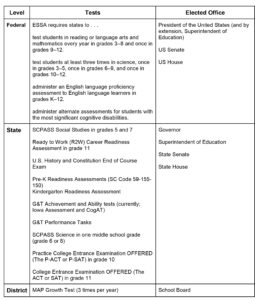From the NCTE Standing Committee on Literacy Assessment
This post was written by NCTE member Chris Hass, a member of the NCTE Standing Committee on Literacy Assessment.
Many of us are feeling anxious about November 3rd. No matter where we fall on the political spectrum there’s a lot at stake because, as Barack Obama once declared, elections have consequences.
As happens every four years, the media coverage of this year’s general election has focused almost solely on who will occupy the White House. Yet, as educators this should not be the only race we’re paying attention to as we prepare to cast our votes in a few weeks. Because while this race is incredibly important and deserving of an informed vote, there are many local elections receiving far less attention that will directly affect the state of public education in each of our classrooms and schools—from insufficient funding to inequitable district policies to the assessments we’re mandated to administer each fall, winter, and spring.
I teach in South Carolina, where more than 6,000 teachers leave their positions each June. At the same time, our state universities are reporting a 30 percent reduction in the number of undergraduates entering education—graduating roughly 1,700 new teachers each year.
This obviously isn’t sustainable. Nor is the fact our state has failed to fully fund public schools for the past 12 years in a row, resulting in more than a $600-per-student deficit that’s forced many classroom teachers to dig into their own pockets to provide the resources and opportunities they know their students need.
And then there are the tests. What started in 2002 under the No Child Left Behind (NCLB) Act and continues now under the Every Student Succeeds Act (ESSA) is a toxic culture of over-testing that not only steals months of instructional time from students but also narrows our curriculum to only those things that can be most easily tested; creates the “need” for countless data meetings that rarely-if-ever support authentic learning; and straps teachers, schools, and districts with an accountability system that at its very best is unreliable and at its worst is grossly negligent.
To better support our public schools, the NCTE Standing Committee on Literacy Assessment urges all educators to be diligent in learning more about candidates running for office at the state and local level—particularly those who play a key role in determining:
- what assessments you are mandated to use in your classroom,
- how these assessments are expected to inform curriculum and instruction, and
- to what degree these single assessments will be used to gauge achievement and what this means for students, teachers, schools, and districts.
The following chart details a sampling of tests in my own district that are mandated at the federal, state, and district level, as well as which elected offices are in a position to change these requirements. To find out which tests your state mandates I suggest you visit your state’s Department of Education website and search “federal and state testing requirements.” Any tests not listed on that webpage will be ones your district has decided to implement on their own.

Of course, our advocacy should not end at the ballot box on November 3rd. Teachers need to be in contact with their elected officials on a regular basis (writing, calling, visiting) to help them better understand how the decisions they make in the political realm—decisions that are too often based on false logic—actually play out in the daily lives of both students and teachers. Only when we advocate for the future of our profession, with both our vote and our voice, will we bring about needed change.

Chris Hass is a second- and third-grade teacher at the Center for Inquiry in Columbia, South Carolina. In addition, he serves as an adjunct professor, teaching undergraduates to integrate culturally relevant pedagogy and social justice teaching into their future literacy classrooms. His first book, Social Justice Talk: Strategies for Teaching Critical Awareness, came out in September.
It is the policy of NCTE in all publications, including the Literacy & NCTE blog, to provide a forum for the open discussion of ideas concerning the content and the teaching of English and the language arts. Publicity accorded to any particular point of view does not imply endorsement by the Executive Committee, the Board of Directors, the staff, or the membership at large, except in announcements of policy, where such endorsement is clearly specified.

